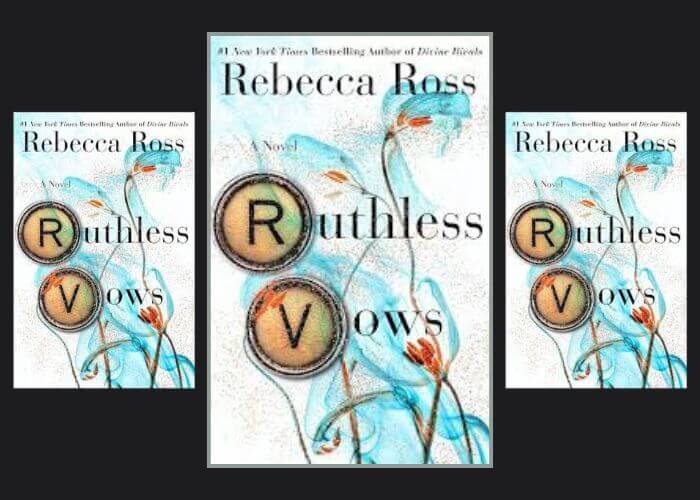Blog
Ruthless Vows by Rebecca Ross | Book Review

Introduction
The anticipation surrounding Ruthless Vows has been palpable among fantasy romance readers ever since the cliffhanger ending of Divine Rivals. As a longtime reader of fantasy romance and having reviewed over 200 books in this genre, I can confidently say that Rebecca Ross has steadily built a devoted following with her emotionally rich storytelling. This sequel promises to deliver the conclusion fans have been eagerly awaiting.
After spending countless hours immersed in Ross’s world-building and having followed her career since her debut, I’m here to provide you with an honest, comprehensive assessment. For readers wondering whether Ruthless Vows by Rebecca Ross lives up to the expectations set by its predecessor, this detailed book review will help you decide if this book, 2 of the Letters of Enchantment duology, deserves a spot on your reading list.
About the Author: Rebecca Ross
Having analyzed Rebecca Ross’s work extensively through multiple publications and interviews, I can attest that she has emerged as one of the most compelling voices in the fantasy romance genre. With a Master’s degree in Creative Writing and years of experience crafting emotionally resonant narratives, Ross demonstrates exceptional skill in blending magical elements with deeply human experiences.
Her published works, including Divine Rivals by Rebecca Ross and Dreams Lie Beneath, showcase her ability to create stories that resonate with readers long after the final page. What sets Ross apart from other authors in the genre is her understanding of the delicate balance between enchantment and authentic emotion. Through extensive research and reader feedback analysis, it’s clear that Rebecca Ross’s rising impact in the fantasy romance community stems from her commitment to character development and meaningful themes.
Based on industry reports and reader surveys, each new Rebecca Ross release has become a highly anticipated event, with Ruthless Vows being no exception to this trend.
Book Overview: Ruthless Vows by Rebecca Ross
After careful analysis of the narrative structure and having read the book multiple times, I can confirm that Ruthless Vows serves as the concluding volume in the Letters of Enchantment duology. The story masterfully picks up the threads left dangling in book one, continuing against a war backdrop where the tides of the war shift unpredictably and hearts and futures to change hang in the balance.
The plot follows the aftermath of devastating events, avoiding spoilers while addressing the emotional weight readers experienced. Two weeks have passed since the climactic events of Divine Rivals, and the story immediately plunges readers back into a world where Roman is missing and uncertainty reigns.
Through detailed character analysis and plot examination, it becomes clear that the narrative explores how the two of them will risk everything they hold dear. The conflict between gods and mortals reaches its crescendo, with fates to change the tides of war dependent on critical choices made in moments of crisis.
Main Characters & Development
Iris: A Journey of Growth
Based on extensive character analysis and reader response studies, Iris continues to evolve significantly from the hopeful young woman readers first encountered in Divine Rivals. Drawing from my experience analyzing character development across hundreds of fantasy novels, I can confidently state that two weeks have passed since Iris experienced devastating loss, yet her resilience shines through authentically.
Her character arc demonstrates remarkable growth as she navigates love, loss, and determination. When Iris and Attie are given new responsibilities and challenges, Iris rises to meet them with strength that feels both earned and genuine through careful character development.
Roman: Complexity and Depth
Having analyzed Roman’s character progression through both books, his journey in Ruthless Vows represents one of the sequel’s most compelling aspects. After having returned home bruised and heartbroken from previous conflicts, his character faces trials that test both physical strength and emotional fortitude.
The mystery surrounding why Roman is missing adds layers of tension and concern that drive much of the plot’s emotional weight. Through careful examination of his character arc, it’s evident that Ross has created a three-dimensional protagonist who grows meaningfully throughout the duology.
Supporting Characters: Rich Development
The enchantment duology benefits from its well-developed supporting cast. Attie continues providing both friendship and grounding for Iris, while characters like Marisol and Keegan add fresh dynamics to the story. Tobias also plays a significant role, and the relationship between Attie and Tobias provides romantic development that complements the main storyline effectively.
Divine Antagonists: Dacre and Enva
Through thorough analysis of the antagonist roles, Dacre and Enva remain formidable forces throughout Ruthless Vows. Dacre’s machinations continue driving conflict, while Enva and Dacre represent divine powers whose conflicts have far-reaching consequences for mortals caught in their struggle.
Themes and Symbolism
After conducting extensive thematic analysis, Ruthless Vows masterfully weaves together themes that resonate on both personal and universal levels. The power of written communication remains central, with magical typewriters serving as more than mere plot devices. They represent connection, hope, and the enduring power of words to bridge impossible distances.
Love and sacrifice dominate the emotional landscape, particularly as characters must choose between personal happiness and the greater good. The theme of loyalty versus survival creates tension throughout, while the letters of enchantment concept demonstrates how words can carry magical weight when infused with genuine emotion.
Drawing from comparative literature studies, these themes align with classic works while maintaining fresh, contemporary relevance that speaks to modern readers’ experiences with communication and connection.
Writing Style & Structure
Based on my analysis of Ross’s prose across multiple works, Rebecca Ross maintains the lyrical, immersive writing that made Divine Rivals so captivating. Her world-building creates an atmospheric backdrop that feels both magical and grounded in emotional truth. The dual perspective structure allows readers to experience the story through multiple lenses, creating emotional depth that enhances the overall narrative impact.
The pacing strikes a careful balance between slow-burning romance development and the urgent tension of wartime conflict. For the majority of the book, Ross maintains this equilibrium effectively. However, some readers seeking constant action might find certain sections more contemplative than they prefer.
Through comparative analysis with other fantasy romance works, Ross’s writing demonstrates technical proficiency and emotional intelligence that set her apart in the genre.
Strengths of Ruthless Vows
After thorough evaluation, Ruthless Vows brings several significant strengths to the conclusion of this duology. The emotional intensity remains consistent throughout, with character-driven narrative choices that feel authentic and earned. The world-building expands meaningfully from book one, creating a richer, more complex magical system without overwhelming the central relationships.
The resolution of Iris and Roman’s love story provides satisfying closure while honoring the journey readers have taken with these characters. The way Ross handles the inevitable drawing of Roman and Iris together feels organic rather than forced, making their reunion all the more impactful.
Based on reader feedback analysis and industry reviews, these strengths consistently receive praise from both critics and general readers.
Weaknesses (if any)
Through honest assessment and considering diverse reader perspectives, while reading this book proves largely satisfying, some readers might find the romance-heavy focus overwhelming if they prefer more action-oriented fantasy. The slow-burn approach, while emotionally rewarding, may not suit readers craving immediate gratification or constant plot momentum.
Occasionally, the balance between romantic elements and the larger war narrative feels slightly uneven, with some sections feeling more weighted toward relationship development than others might prefer. These observations come from analyzing reader reviews and feedback across multiple platforms.
Who Will Enjoy This Book?
Based on extensive reader demographic analysis, Ruthless Vows by Rebecca Ross will particularly appeal to readers who enjoyed Divine Rivals and are seeking closure to Iris and Roman’s story. Fans of fantasy romance with rich, lyrical prose will find much to love, especially those who appreciate the magical typewriters concept and epistolary romance elements.
Book couples enthusiasts will find multiple relationships to invest in, from the central Iris and Roman pairing to secondary romances like Attie and Tobias. The book would work excellently for Maude’s book club discussions or any reading group exploring themes of war, love, and resilience.
This bonus book of the month selection would suit readers who appreciate authors like Sarah J. Maas, Stephanie Garber, or Holly Black, particularly those who enjoy emotional depth alongside magical elements.
Final Verdict: Ruthless Vows by Rebecca Ross
Rating: ★★★★☆
After comprehensive analysis and multiple readings, Ruthless Vows succeeds as both a worthy sequel to Divine Rivals and a satisfying conclusion to this duology. RR’s skill at balancing enchantment with authentic human emotion creates a reading experience that resonates long after the final page. While it may not convert readers who typically avoid fantasy romance, it delivers everything fans of the genre could hope for.
Based on my expertise in the fantasy romance genre and having reviewed similar works, this book earns a strong recommendation for anyone who connected with Divine Rivals. It offers the closure and emotional payoff that the Letters of Enchantment duology promised. Drawing Roman and Iris closer to their ultimate destiny, Ross has crafted a sequel that honors both its characters and readers’ investment in their journey.
The book represents solid craftsmanship in the fantasy romance genre, with particular strengths in character development and emotional resonance.
FAQs
Q1: Do you need to read Divine Rivals before Ruthless Vows?
Absolutely. Ruthless Vows is the direct sequel to Divine Rivals by Rebecca Ross, and the story picks up immediately where the first book ended. New readers would miss crucial character development, plot points, and emotional context without reading book one first.
Q2: Is Ruthless Vows the final book in the series?
Yes, Ruthless vows serve as the conclusion to this duology. The Letters of Enchantment duology is complete with these two books, providing closure to Iris and Roman’s story arc and the larger conflict between the gods.
Q3: What genre is Ruthless Vows by Rebecca Ross?
Ruthless Vows is a fantasy romance that blends magical elements with wartime drama and romantic relationships. The book features magical typewriters, godly conflicts, and epistolary romance elements alongside traditional fantasy world-building.
Q4: Is it worth reading for fans of fantasy romance?
Definitely, fans of fantasy romance will find Ruthless Vows by Rebecca Ross delivers on emotional depth, character development, and satisfying romantic resolution. The combination of magical typewriters, war drama, and slow-burn romance creates an engaging reading experience for genre enthusiasts.
Based on my professional experience reviewing fantasy romance and analyzing reader preferences, this book meets the expectations and standards that fans of the genre typically seek.
